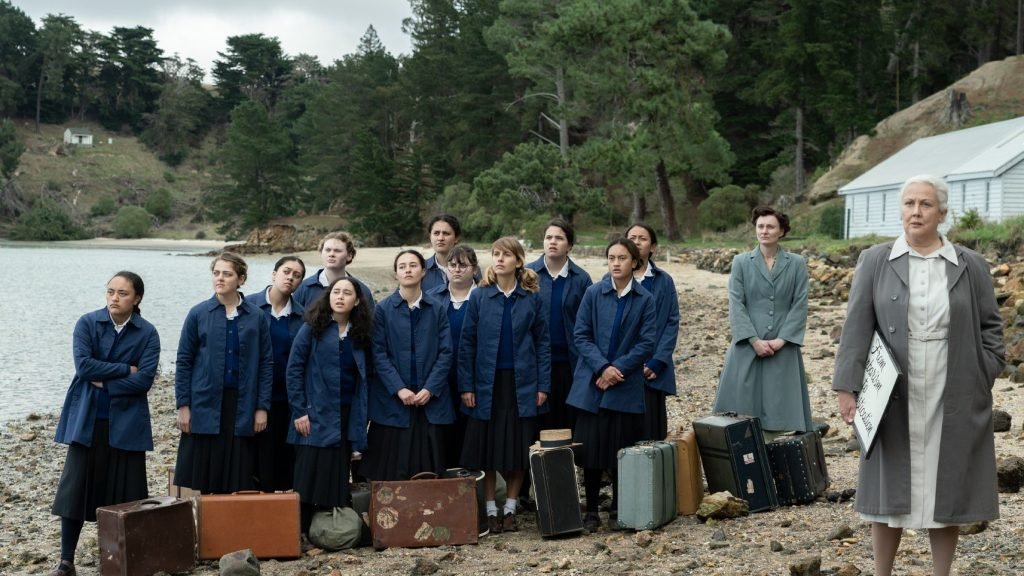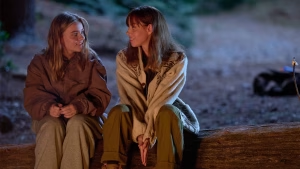1954, New Zealand: an increasingly prosthelytised nation is fresh off its 1947 self-declaration of legislative independence from the post-colonial wake of the British. Here we find Māori director Josephine Stewart-Te Whiu‘s fictional Te Motu School for Incorrigible and Delinquent Girls, the setting of her debut feature, We Were Dangerous (2023), which most recently screened at Tromsø International Film Festival in the Norwegian city north of the Arctic circle. The school — or rather, institution — seeks to set young girls straight (pun intended) and reform “whores, queers, and sex deliquents”, as diligently explained by the school’s unceasingly strict and devoutly Christian Maori matron (Rima Te Wiata). Under the euphemisms of its name lies, of course, its true purpose: to indoctrinate girls and young women, mostly Māori, into becoming subservient, demure, and Christian housewives in a boldly colonial fashion.
With a screenplay by Maddie Dai, Stewart Te-Whiu’s debut feature is constructed under this threatening premise but makes somewhat surprising tonal choices that make one understand why the film received positive reactions during its world premiere at South by Southwest (SXSW) in March 2024, where it also collected a Special Jury Award for Filmmaking. The film opens with an exhilarating escape-from-the-institution sequence that sets the story’s anxious pacing and teen girl antics, even if the film never reaches that level of thrills again. After this failed escape attempt led by Nellie (a deliriously charming Erana James, best known for her TV role in The Wilds), a natural-born leader and rebellious older Māori teen, the girls are all shipped off to an island to live in ramshackle wooden cabins they must refurbish themselves and attend lessons with the matron in a one-room schoolhouse. The film is executive produced by Taika Waititi, whose flavour of offbeat humour can also be read in the film, even if said flavour doesn’t always feel suitable for the material.
Interestingly, the film is narrated by the matron rather than any of the girls, creating a sort of sardonic atmosphere that mainly serves as a reason to explore the backstories of the trio of protagonist girls. Nellie, who was sent to live with extended family members in Christchurch and never found them, is arrested after shoplifting with young Daisy (Manaia Hall), a cutesy naïve Māori teen who bounced from terrible foster home to terrible foster home. After arriving on the island, the matron assigns the duo to the leaky hut along with a new wealthy white teen Louisa (Nathalie Morris), or Lou, who the matron reveals was sent to the institute by her father after she was caught kissing—or perhaps more—her female tutor. Initially an outcast, Lou is enchanted by Nellie’s indolence and is quickly brought on as a friend, while Nellie also acts as a surrogate older sister to Daisy (the latter two dutifully refer to each other by the Kiwi term of endearment, “cuz”).

We Were Dangerous traces the trio’s attempts to resist the institute’s brainwashing efforts and avoid punishment, to the matron’s great displeasure, only reinforcing her insistence on harsher and harsher measures. The filmmaker includes some creative cinematographic choices, including a few dramatic angle shifts that place the girls’ freest moments onto a different plane of existence. Something clearly much more sinister is at play, although the film’s tone is oddly more infantilising and playful than dehumanising and genocidal—that is, until a mid-film reveal turns the story on its head. One could easily conceive of the same story with much darker undertones, just as the film’s happy-go-lucky approach to the material almost undermines the brutal (post-)colonial history that Stewart Te-Whiu intends to bring to light. It thus could be seen as an accessible film for young audiences, maybe, with no onscreen violence and no extreme visual elements despite the grim realities shown.
It would be remiss not to also mention the queer elephant in the room: Lou’s sexuality as introduced, but never built upon, while the girls are on the island. Romantic involvement between Lou and Nellie seems like the natural progression of James’ and Morris’ onscreen chemistry and their characters’ platonic intimacy, yet the story never goes down this path despite their friendship’s heavily sapphic undertones. Of course, this is a choice to be made by the screenwriter and director—and perhaps these undertones simply did just emerge as a byproduct of the characters. But their closeness is so richly developed that it feels like a shame to not return to Lou’s past in that way, or any other way, to say the least. In a Chekhov’s gun fashion, one even expects it to occur given Lou’s brief backstory.
Although the film is only 82 minutes, it feels considerably longer, likely due to the film’s light-touch approach to intense thematic material that never allows the viewer to really gnaw on its implications. It further bleeds into the cracks created by small details in the story, like the girls’ living quarters (which hardly seem believable) and the brief mention of a Chinese leper who used to live on the island—although this clicks into place after learning that screenwriter Dai was inspired by stories from an ancestor who was imprisoned on an island in New Zealand. This uneasy tension between content and style remains throughout the film, rendering it overly simplistic and too tidied up—and regrettably so, because Stewart Te-Whiu’s charming cinematic tone applied to most other coming-of-age films would be a marvel. But We Were Dangerous is still a joyous ride, even if one ends up a bit unsure of its approach by the end.





